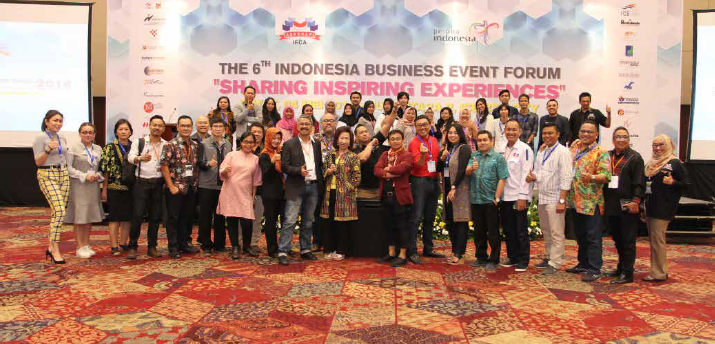What is the government's positioning for Indonesia MICE industry? Are there any official supporting policies? What is the role of Indonesia Exhibition Companies Association (IECA / ASPERAPI) in industry development?
Setiabudi: Since the early administration of President Joko Widodo in 2014, the government has pledged very strong support to the development of Indonesian MICE industry. Strategic development plan puts highest priority in "Triple A" of Accessibility, Attractions and Amenity of tourism that directly and positively impact MICE industry.
Well coordinated programs have been embarked including the Top Ten Priority Destinations beyond Bali. As the central government accelerates construction projects of infrastructure for the Triple A development, ongoing coordination among the Indonesian Ministry of Tourism in partnership with other Ministries have garnered power with 10 Provincial Governors to push the "man-made category" of tourism attractions: MICE events.
The government policy has created more conducive environments for IECA / ASPERAPI to organizer Meetings, Incentives, Conferences and Exhibitions, pursuant to the capacity of IECA members consisting of Exhibition Organizers, Convention Organizers, Freight Forwarders, Stand Contractors, Exhibiting Hall Owners, Suppliers and Supporting industries representing 14 regions in Indonesia.
IECA/ASPERAPI has become the main partner of the government for the national development of MICE in which IECA events gain support and participation from the related government institutions.
What do you think are the country’s advantages and challenges in MICE?
Setiabudi: Indonesia is blessed with advantages in natural and cultural resources from more than 17,000 islands with over 300 ethnic groups with different inherited culture and traditions. Culturally, Indonesia is home to the largest Buddhist temple of Borobudur and Hindu's temple of Prambanan,
each with exclusive development complexes for tourism and MICE events.
Main challenges, as addressed by the government for improvement are ICT Readiness, Ground and Port Infrastructure and Tourist Service Infrastructure. That's why the government is seriously accelerating the supporting infrastructure as well as offering supports and incentives for these infrastructure investments.
What is the situation of Indonesia MICE industry in terms of international cooperation now and in the future? How about with China?
Setiabudi: In the past few years, international cooperation is MICE industry is showing significant progress as indicated by the successful organizing of Asian Games & Para-Games 2018 co-hosted jointly in capital Jakarta and Palembang (South Sumatra Province, August-September 2018) with 45 participating countries, and also the IMF-World Bank Annual Meeting in October 2018 in Bali with 189 participating countries. Each the international events require MICE industry professionalism of PEO, PCO, Liaison Officers and many more.
MICE industry partnership and cooperation with China is showing very positive trend, in which IECA is invited and engaged in MICE conferences and fairs in Xiamen, Shanghai, Guangzhou, Ningbo and many more. At the same time, a lot of Chinese companies have joined in international exhibitions in Indonesia.
In your MICE career, what do you think are the major changes in the industry? How can event organizers keep the convention and exhibition projects thriving continuously?
Setiabudi: I do believe that Indonesian MICE industry are only changing for a better trend of development, in line with Indonesian sustainable of economic growth as boosted with nationwide infrastructure development projects and economic policy packages are are going more pro-market.
Specifically in exhibition industry, we are excited to see that venue owners keep on adding new annex buildings and facilities for accommodating bigger events such as happening with Jakarta's JIEXPO and JCC, followed by other venue owners and other cities.
To keep convention and exhibition project thriving continuously, IECA has long embarked on close partnership with related partners, building up synergy among members and partners, as well as professionalism development with certification programs that are aimed at building up better capacity for exploring opportunities and tackling challenges.
What is your expectation or concrete purposes for the upcoming 2019 UFI Asia-Pacific Conference? How do you comment on industry exchange activities such as these?
Setiabudi: The upcoming UFI Asia-Pacific Conference should shed more highlight on how to further strengthen Asian MICE players' role-play in and across the continent with stronger partnership across different governments.
Industry exchange activities are the gateway toward better understanding of potential development across different countries and wider business networking opportunities.
